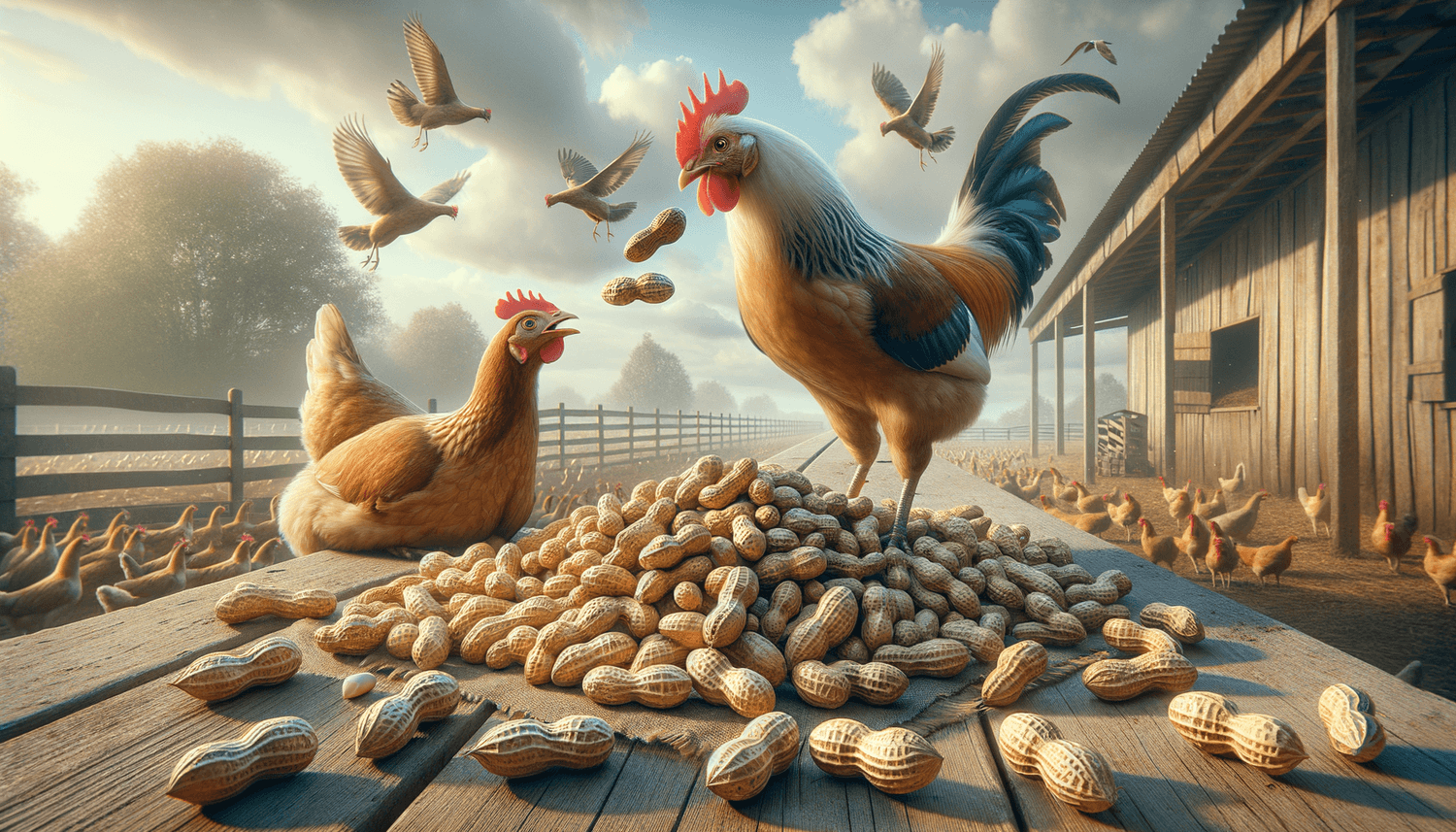Welcome, fellow feathered-friend fanatics, to our clucking great discussion on the ultimate peanut predicament! Ever wondered if your bountiful backyard birds can indulge in these nutty treats? Well, you’re in the right place! In this informative post, we’ll delve into whether or not chickens can eat peanuts, the importance of a balanced diet, the potential benefits and risks, the nutritional value for our fine feathered friends, and how you can best prepare these tasty tidbits for your chatty chickens. So stay tuned and get ready to crack the code on this crunchy conundrum!
Can chickens eat peanuts?
Yes, chickens can indeed eat peanuts, and it is generally safe for them to do so. However, it’s essential to feed peanuts to chickens in moderation, as too many peanuts can lead to an unbalanced diet. As long as peanuts are unsalted, unflavored, and fed appropriately, they can serve as a nutritious and protein-rich treat for your backyard flock.
Balanced diets for happy, healthy chickens
Just like humans, chickens thrive when they maintain a balanced diet. A solid nutritional foundation is the key to keeping your pet poultry productive and healthy. The primary component of a chicken’s diet should be high-quality chicken feed. This specially formulated feed provides the necessary nutrients, vitamins, and minerals to ensure your feathered friends’ well-being and productivity. Chicken feed should comprise around 80-90% of your chickens’ overall diet, setting the stage for their nutritional success.
With the majority of their diet coming from chicken feed, the remaining 10-20% can be made up of treats such as fruits and vegetables. These tasty snacks not only add variety to your chickens’ diet but also help keep them entertained as they peck and scratch in search of extra goodies. Offering these tasty and healthy treats in moderation is a wonderful way to show your chickens some love and keep their diet balanced and fulfilling.
Nutritional value of peanuts for chickens.
Peanuts are packed with nutritional value and can make an excellent treat for chickens when fed appropriately. These tasty nuts contain a significant amount of protein, which is essential for strong muscle development, good egg production, and the overall well-being of your chickens. Protein is especially important for growing chicks, as it helps them develop at a healthy and steady pace.
In addition to protein, peanuts also contain beneficial vitamins and minerals, such as Vitamin E and B, which support healthy feathers, eggs, and immune systems. Moreover, peanuts are a good source of unsaturated fats, which can provide a quick energy boost to your flock, especially during colder months. Peanuts also contain essential nutrients like potassium, magnesium, and phosphorus, which contribute to the overall health and well-being of your chickens.
However, it’s worth noting that peanuts are relatively low in moisture content, so it’s essential to ensure that chickens have access to fresh water at all times. To avoid overconsumption, peanuts should be fed in moderation, alongside their regular chicken feed and other fruits and vegetables. Peanuts can be a nutritious and enjoyable part of your chicken’s diet, but it’s essential to maintain a healthy balance and provide a good mix of other treats and food sources as well.
Nutrition table of peanuts for chickens.
| Information | Description |
|---|---|
| Nutritional Value | High in protein, vitamins E and B, unsaturated fats, potassium, magnesium, and phosphorus |
| Suggested Serving Size | A small handful of peanuts per chicken, fed as an occasional treat |
| Safe Feeding Practices | Feed unsalted, unflavored peanuts in moderation; avoid feeding too many peanuts to prevent imbalance in diet |
| Preparation | Raw or roasted peanuts, crushed or broken into smaller pieces for easy consumption |
| Potential Risks | Overfeeding peanuts can lead to an unbalanced diet, obesity, or other health issues |
| Hydration | Low moisture content; ensure chickens have access to fresh water while consuming peanuts |
| Digestion | Easily digestible for chickens when fed in appropriate quantities and broken into smaller pieces |
| Seasonal Availability | Available year-round, making them a convenient treat option |
| Other Benefits | Can provide quick energy for chickens, particularly in colder months, and may promote healthy feathers, egg production, and immune system |
Preparing peanuts for your chickens
When it comes to feeding peanuts to your chickens, it’s important to ensure they are easy for your birds to consume. Raw or roasted peanuts are both acceptable options, but take care to avoid salted or flavored varieties, which may not be suitable for your chickens. To make the peanuts more digestible and reduce the risk of choking, crush or break the peanuts into smaller pieces before offering them to your flock.
Alternative protein sources for chickens
Although peanuts can be a valuable source of protein for your chickens, it’s a good idea to diversify their diet with different protein sources. Some other protein-rich treats to consider for your chickens include mealworms, black soldier fly larvae, seeds, yogurt, and cottage cheese. By mixing it up, you can ensure that your chickens receive a good balance of nutrients and keep them eagerly awaiting their next treat.
Monitor your chickens’ health
As a responsible chicken owner, it is crucial to monitor your flock’s health and pay close attention to their eating habits. This will help you identify any potential issues that may arise from their diet, including poor egg production, weight gain, or signs of illness. Be prepared to make adjustments to their feeding regimen if needed, consulting a veterinarian if you have concerns about your chickens’ health. Remember, the key to keeping your chickens happy and healthy is to provide a balanced diet and stay informed about their nutritional needs.

















